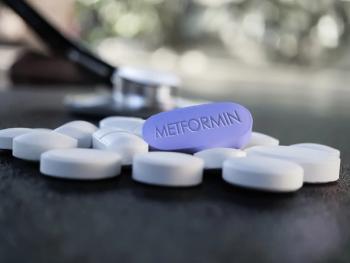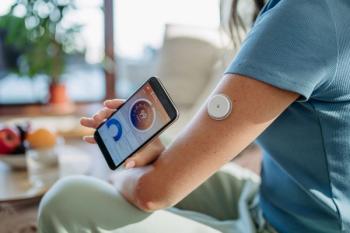
A study found continuing metformin through the first trimester was linked to greater clinical pregnancy rates in women with PCOS.

A study found continuing metformin through the first trimester was linked to greater clinical pregnancy rates in women with PCOS.

A study found thyroid hormone imbalance across multiple pregnancy trimesters was associated with increased autism spectrum disorder risk in children.

Melanie Barrett, MD, highlights brexanolone’s ability to quickly and durably reduce depressive and anxiety symptoms in postpartum women.

New research shows that obesity-related increases in estrone after menopause may drive inflammation and tumor growth.

A protein-based, liquid biopsy screening test demonstrated greater than 90% sensitivity and specificity for early breast cancer detection.

Breast arterial calcification on mammography is associated with higher cardiovascular risk and mortality, suggesting the need for risk assessment.

New neurokinin receptor antagonists such as fezolinetant and elinzanetant are reshaping treatment options for menopausal hot flashes.

New evidence integrating RCTs and global population studies confirms that early human papillomavirus vaccination directly prevents cervical cancer.

Laura Jelliffe-Pawlowski, PhD, MS, explains how the PTB-ARIx tool leverages modifiable clinical factors to strengthen patient-provider communication.

A trial found that replacing beef with a plant-based meat substitute rapidly changed the fatty acid composition of breast milk.

Review some of the top stories from the Contemporary OB/GYN website over the past week and catch up on anything you may have missed.

ACS updates cervical cancer screening guidance, adding HPV self-collection and clarifying criteria for safely discontinuing screening at older ages.

A randomized trial found that real-time continuous glucose monitoring reduced large-for-gestational-age births compared with self-monitoring in gestational diabetes.

A study found women with hyperemesis gravidarum face significantly greater risks of prepregnancy and postpartum depression.

In phase 2 trials, cendifensine significantly reduced the frequency and severity of menopausal hot flashes and may offer broader symptom relief benefits.

David Lissauer, PhD, discusses how the APT-Sepsis program delivered a sustained 32% reduction in severe maternal infection outcomes

Higher maternal vitamin D levels in pregnancy were associated with reduced odds of early childhood caries and lower DMFT scores in offspring.

Camille Powe, MD, discusses how discontinuing GLP-1 receptor agonists before or during pregnancy may increase gestational weight gain and metabolic risks.

A new study reveals 3 NAD-related metabolites elevated in women with recurrent miscarriage, indicating potential risk identification.

Discontinuing GLP-1 receptor agonists before or early in pregnancy was associated with greater gestational weight gain and higher risks of diabetes, hypertension, and preterm birth.

A Delphi-based consensus process has defined standardized criteria for diagnosing primary dysmenorrhea.

A study reveals how invisible symptoms, provider bias, and inconsistent clinical pathways contribute to endometriosis diagnostic delays.

A review found increased rates of endometriosis vs adenomyosis, alongside significant diagnostic variability.

Take a quick look at everything you may have missed in November, including the latest FDA updates, top stories, and expert recommendations.

New data highlight how optical genome mapping can uncover chromosomal abnormalities missed by traditional tests.

An analysis found significant geographical disparities in the availability and quality of endometriosis guidelines.

A review reported insufficient evidence connecting prenatal paracetamol exposure to autism or ADHD.

A review found that most countries lack dedicated endometriosis policy frameworks, highlighting Australia and France as leading models.

Review some of the top stories from the Contemporary OB/GYN website over the past week and catch up on anything you may have missed.

Holiday meals carry extra food safety risks for pregnant patients. Here’s what ob-gyns should remind them before Thanksgiving gatherings.